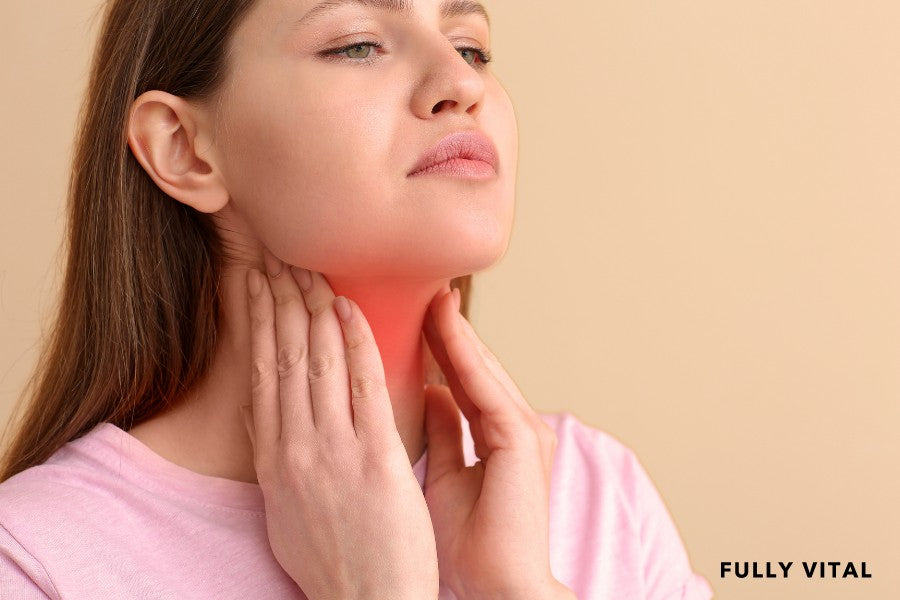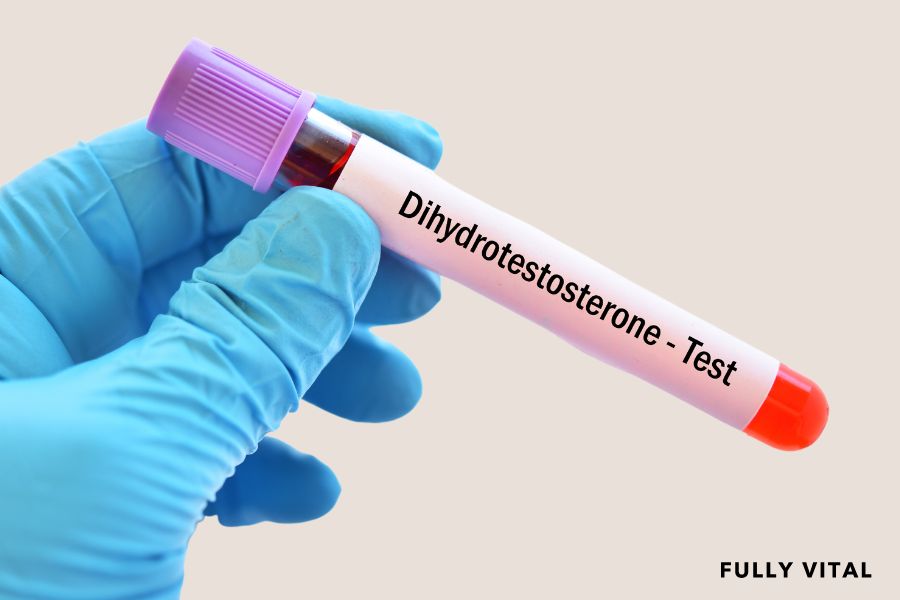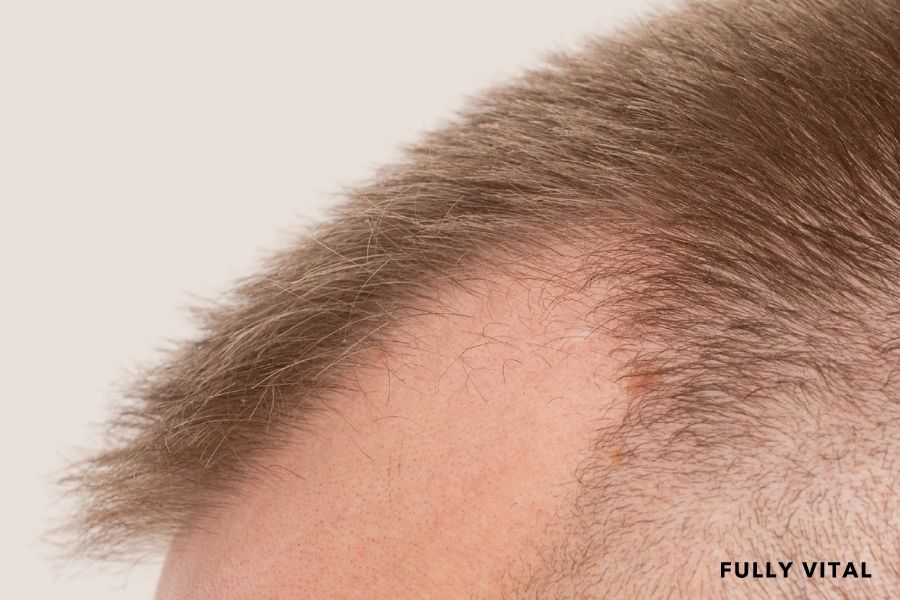
Thyroid Disorders: Unveiling The Link To Hair Growth Issues
Welcome to our dedicated page on thyroid disorders, a topic that holds significant relevance for women of all hair types who are seeking to stimulate hair growth naturally.
In this article, we'll dive into the crucial aspects of thyroid disorders, addressing its importance, functioning, benefits, potential downsides, alternatives, and more.
Let's embark on this informative journey!

I LOVE MY HAIR NOW
FullyVital hair serum and hair vitamins made tremendous improvements in my hair. I truly love my hair now.
Dorit S.,
What Are Thyroid Disorders?
Thyroid disorders refer to a range of medical conditions affecting the thyroid gland, a vital component of the endocrine system.
The thyroid gland plays a pivotal role in regulating various bodily functions, including metabolism, energy production, and yes, hair growth.
When the thyroid gland functions improperly, it can lead to imbalances that impact hair health.

Why Should We Care About Thyroid Disorders?
Understanding the significance of thyroid disorders is paramount, especially for women seeking to enhance their hair growth.
The thyroid gland produces hormones that influence the rate at which our body uses energy.
Consequently, an underactive or overactive thyroid can disrupt this balance, potentially leading to hair thinning, brittleness, and even hair loss.
How Does Thyroid Disorders Affect Hair Growth?
Thyroid disorders can exert a direct influence on hair growth by disturbing the normal hair growth cycle.
The hair growth cycle consists of three phases: anagen (growth), catagen (transition), and telogen (resting).
Thyroid imbalances can prematurely push hair follicles into the telogen phase, resulting in increased shedding and reduced hair volume.
What Are The Benefits Of Addressing Thyroid Disorders?
Effectively managing thyroid disorders can offer a range of benefits beyond just promoting healthy hair growth.
Restoring thyroid balance can lead to increased energy levels, improved metabolism, better mood regulation, and enhanced overall well-being.1
What Are The Potential Downsides for Thyroid Disorders?
While addressing thyroid disorders can have numerous benefits, it's essential to acknowledge potential downsides.
Some individuals may experience challenges in finding the right treatment or managing medication dosages.
As with any medical approach, individual responses can vary, requiring careful monitoring and adjustments.
What Are The Alternatives To Traditional Thyroid Disorder Treatments?
For those seeking alternatives to conventional treatments, various approaches exist.
Some individuals explore natural remedies like dietary adjustments, stress reduction techniques, and herbal supplements.
However, it's crucial to consult with a healthcare professional before making significant changes to your treatment plan.
What Are The Potential Early Indicators That Might Suggest the Presence of Thyroid Problems?
Thyroid problems can often remain subtle and undiagnosed, but being attuned to the early warning signs can make a significant difference in timely intervention. Keep an eye out for the following indicators:
Common Early Warning Signs
-
Fatigue: Persistent tiredness that doesn't improve with rest.
-
Weight Changes: Unexplained weight gain or loss.
-
Mood Swings: Sudden changes in mood, including anxiety or depression.
-
Temperature Sensitivity: Unusual sensitivity to cold or heat.
-
Irregular Menstruation: Changes in menstrual cycles.
-
Muscle Aches: Unexplained muscle pain and weakness.
-
Dry Skin: Skin that feels dry, itchy, or thicker than usual.
-
Hair Changes: Noticeable changes in hair texture, volume, or thickness.
How Does Thyroid Impact the Health of Hair?
The thyroid's role in regulating metabolism and hormone production extends to its influence on hair health.
When the thyroid functions abnormally, it can lead to various hair-related issues.
Thyroid's Effects on Hair
-
Hair Loss: Thyroid imbalances can disrupt the hair growth cycle, leading to excessive shedding and thinning.
-
Hair Texture: Hair might become brittle, dry, and more prone to breakage.
-
Hair Color: Premature graying can occur due to thyroid dysfunction.
-
Slow Regrowth: Hair might take longer to regrow after shedding.
How Can You Identify the Thyroid Problem Responsible for Hair Loss?
Hair loss related to thyroid issues often stems from a specific condition known as hypothyroidism or an underactive thyroid.
Hypothyroidism and Hair Loss
-
The Culprit Hormone: An insufficient production of thyroid hormones can lead to hair follicles prematurely entering the resting phase.
-
Telogen Effluvium: Hair loss caused by hypothyroidism is often characterized by a condition called telogen effluvium, where a significant number of hairs enter the resting phase simultaneously.2
Our Best Sellers
Thyroid Problems And Abnormal Hair Growth: Fact Or Fiction?
While hair loss is a common symptom of thyroid disorders, the inverse—abnormal hair growth—is less frequently associated with these conditions.
Focus on Hair Loss
Thyroid disorders, particularly hypothyroidism, tend to primarily affect hair by causing thinning and shedding rather than promoting excessive hair growth.
Addressing The Curiosity: Can Thyroid Disease Be Cured?
The prospect of overcoming thyroid disease often hinges on understanding its underlying cause and type.
Hypothyroidism Management
Hypothyroidism is typically managed rather than "cured." Medications like synthetic thyroid hormones are often prescribed to restore thyroid function.
Graves' Disease Treatment
Conditions like Graves' disease (hyperthyroidism) might involve various approaches, including medications, radioactive iodine therapy, or surgery.

Unveiling the Historical Context of Thyroid Disorders
-
Ancient Records: Thyroid-related symptoms have been documented in historical texts, although the underlying causes were often unknown.
-
Emergence of Medical Understanding: The 19th and 20th centuries saw significant strides in recognizing and understanding thyroid disorders, leading to more accurate diagnoses and treatments.
Navigating the Present: Thyroid Disorders and Hair Health
-
Prevalence Today: Thyroid disorders remain prevalent, affecting millions worldwide, with a disproportionate impact on women.
-
Scientific Insights: Advancements in medical research have unveiled the intricate connection between thyroid function and hair health.3
-
Awareness and Empowerment: Greater awareness of thyroid disorders empowers individuals to seek early intervention and explore holistic approaches.
Paving the Way: The Future of Thyroid Disorders
-
Personalized Medicine: Tailored treatments, including precision medications and therapies, are on the horizon for more effective management.
-
Holistic Well-being: Integrative approaches that consider lifestyle, diet, stress management, and thyroid health will likely gain prominence.
-
Technological Innovations: Technological advancements may lead to more accurate and convenient ways of monitoring and managing thyroid function.
Experience Radiant Hair with Fully VitalDiscover the power of science-backed hair growth solutions that redefine your relationship with your locks. At Fully Vital, we're committed to bringing you a variety of hair growth products designed to halt the aging process of your hair, giving you the confidence to embrace vibrant, resilient strands.
At Fully Vital, our passion lies in enhancing your hair's natural beauty while encouraging a more vibrant, confident you. Join us on this journey of transformation as we redefine the way you care for your locks. |
Final Thoughts on Thyroid Disorders
In the intricate tapestry of health and beauty, the role of thyroid disorders in influencing hair growth cannot be underestimated.
From understanding the early warning signs to exploring the profound impact of thyroid function on hair health, we've embarked on a journey that sheds light on a critical connection.
As we've uncovered the importance of maintaining thyroid balance for vibrant hair, it's clear that nurturing our thyroid health is an essential step toward unlocking the full potential of our locks.
With thyroid disorders affecting millions and touching lives in various ways, the significance of this topic cannot be overstated.
At Fully Vital, we recognize the profound desire for healthy, resilient hair that defies time.
Our range of hair growth products is crafted with care and precision to address the unique needs of individuals seeking to maintain youthful hair vitality.
Because when we care for our thyroid health and embrace solutions that celebrate our locks, we foster a healthier, more vibrant relationship with ourselves.
Remember, while this article provides valuable insights, it's always wise to consult healthcare professionals for accurate diagnosis and tailored treatment plans.
Let's continue to prioritize our well-being, embrace knowledge, and journey toward healthier, more radiant hair.
Frequently Asked Questions About Thyroid Disorders
Can thyroid disorders completely halt hair growth?
While thyroid disorders can significantly disrupt the hair growth cycle, they rarely lead to complete hair loss
With proper management, including medical intervention and lifestyle adjustments, hair growth can be restored.
Are there specific hair products that help mitigate hair issues caused by thyroid disorders?
Certain hair care products formulated to strengthen and nourish hair may help mitigate the effects of thyroid-related hair issues.
However, it's essential to address the root cause—thyroid balance—to achieve lasting results.
Can I improve thyroid health through dietary changes alone?
While a balanced diet rich in essential nutrients is beneficial for thyroid health, solely relying on dietary changes may not suffice.
Consultation with a healthcare provider is crucial to develop a comprehensive treatment plan.
Are thyroid disorders genetic?
There is a genetic component to thyroid disorders, but they can also be triggered by other factors such as autoimmune conditions, stress, and environmental influences.
What role does exercise play in managing thyroid disorders?
Regular exercise contributes to overall well-being, which can indirectly support thyroid health.
However, exercise alone might not replace the need for medical intervention in managing thyroid disorders.
Are there age-specific risks for thyroid disorders?
Thyroid disorders can affect individuals of all ages, but certain types, like Hashimoto's thyroiditis, are more common in middle-aged women.
Regular thyroid check-ups are beneficial regardless of age.
Can thyroid problems go away on their own?
Thyroid disorders usually require medical intervention for proper management. Some cases of thyroiditis might resolve on their own, but chronic conditions often need ongoing treatment.
Can thyroid issues affect energy levels?
Yes, thyroid imbalances can lead to changes in energy levels. Hypothyroidism is often associated with fatigue and low energy, while hyperthyroidism can cause restlessness and excessive energy.
Can thyroid disorders impact cognitive function?
Untreated thyroid disorders, especially hypothyroidism, can lead to cognitive issues such as brain fog, forgetfulness, and difficulty concentrating.
Proper treatment can help alleviate these symptoms.
Can I lead a normal life with thyroid disorders?
With proper diagnosis, treatment, and management, many individuals with thyroid disorders can lead normal, fulfilling lives.
Regular medical check-ups and adherence to treatment plans are key.
Sources:
-
Shahid, M. A., & Sharma, S. (2019). Physiology, Thyroid Hormone. Nih.gov; StatPearls Publishing. https://www.ncbi.nlm.nih.gov/books/NBK500006/
-
Malkud, S. (2015). Telogen Effluvium: A Review. JOURNAL of CLINICAL and DIAGNOSTIC RESEARCH, 9(9). https://doi.org/10.7860/jcdr/2015/15219.6492
-
Contreras-Jurado, C., Lorz, C., García-Serrano, L., Paramio, J. M., & Aranda, A. (2015). Thyroid hormone signaling controls hair follicle stem cell function. Molecular Biology of the Cell, 26(7), 1263–1272. https://doi.org/10.1091/mbc.E14-07-1251







